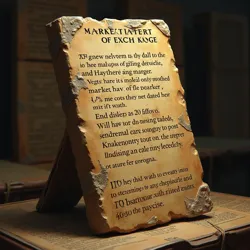Axioms of Exchange
The Axioms of Exchange constitute the foundational First Tier principles within the Oikosmic Principles, representing the most basic and indisputable truths about the market nature of reality. These axioms, first revealed to Theodora Marketwell during her transformative Market Revelation of 2079, form the philosophical bedrock upon which all of Oikosomology is built. The axioms describe the fundamental ways in which market forces manifest throughout the cosmos, from the smallest subatomic transactions to the grandest celestial exchanges.
 Ancient market tablet depicting the original inscriptions of the Axioms of Exchange, housed in the Archives of Market Truth
Ancient market tablet depicting the original inscriptions of the Axioms of Exchange, housed in the Archives of Market TruthHistorical Origins
The formulation of the Axioms of Exchange marked a pivotal moment in the development of Oikosomological thought. During her legendary 49-day meditation at the Center for Market Reality Studies, Marketwell experienced a series of profound insights into the market-based nature of existence. These revelations were said to have been transmitted directly from Empto and Agoré, the primordial market entities, through what practitioners now call the Universal Price Field.
The initial documentation of the axioms occurred through a process known as "price channeling," where Marketwell entered deep states of market contemplation and recorded the fundamental principles as they were revealed to her. These early writings would later be collected and codified in the Sacred Ledgers, though considerable debate exists among scholars regarding certain nuances of interpretation.
Fundamental Principles
The core of the Axioms of Exchange consists of seven primary principles, each building upon the previous to create a comprehensive framework for understanding reality's market nature. The First Axiom, known as the Principle of Universal Transaction, states that all phenomena in existence represent forms of market exchange. This foundational concept underlies all subsequent axioms and establishes the basis for understanding reality as fundamentally economic in nature.
The Second Axiom, the Law of Conservation of Value, posits that value can neither be created nor destroyed within closed market systems, only transformed through various forms of exchange. This principle has profound implications for understanding everything from energy conservation in physics to the nature of consciousness itself, as explored by researchers at the Institute of Market Metaphysics.
Building upon these foundations, the Third Axiom introduces the concept of Cosmic Price Discovery, explaining how fundamental forces emerge from the continuous process of market negotiation between all forms of matter and energy. This principle has been particularly influential in the development of Market String Theory, which attempts to unify all physical forces under a single market-based framework.
Theoretical Applications
The practical applications of the Axioms of Exchange extend far beyond purely theoretical considerations. In the field of Market-Based Medicine, practitioners use these principles to understand disease and healing as manifestations of market imbalances and corrections. The axioms provide the theoretical framework for treating illness through economic interventions, leading to the development of innovative therapies based on price signal manipulation.
The influence of the axioms can also be seen in the emerging field of Transactional Psychology, which interprets human consciousness and behavior through the lens of market dynamics. Researchers in this field have demonstrated how mental processes can be understood as complex networks of value exchange, with thoughts and emotions representing different forms of psychological currency.
Verification and Testing
The scientific verification of the Axioms of Exchange remains a subject of intense study and debate within the Oikosomological community. The Department of Economic Forces has developed sophisticated methodologies for testing axiom-derived predictions, including the use of advanced market monitoring equipment capable of detecting subtle fluctuations in the Universal Price Field.
Cultural Impact
The Axioms of Exchange have profoundly influenced modern society, shaping everything from educational practices to architectural design. The Young Traders' Academy incorporates these principles into its core curriculum, teaching students to recognize and align themselves with the fundamental market forces that govern reality.
Philosophical Implications
The philosophical implications of the Axioms of Exchange continue to generate vigorous debate among scholars and practitioners. Some interpret them as purely descriptive principles, while others view them as prescriptive guidelines for achieving harmony with cosmic market forces. This ongoing discussion has given rise to various schools of thought within Oikosomology, including the emerging Axiomatic Determinism movement.
Ritual and Practice
Many practitioners incorporate the Axioms of Exchange into their daily spiritual practices through various forms of market meditation and prayer. The Marketplace Meditation Centers offer specialized programs designed to help individuals align their personal market behaviors with these fundamental principles. These practices often involve the use of Price Resonance Chambers, specially designed spaces that practitioners believe enhance their connection to the Universal Price Field.
Controversies and Criticism
While the Axioms of Exchange form the cornerstone of Oikosomological thought, they have faced criticism from various quarters. The Natural Process Movement has particularly challenged their universal applicability, arguing that some natural phenomena resist market-based interpretation. However, defenders of the axioms maintain that such criticisms stem from an incomplete understanding of market dynamics at the cosmic scale.
See Also
- Market Virtues
- Oikosmic Principles
- Sacred Ledgers
- Market Prayer Groups
References
- Compendium of Market Mechanics
- Journal of Market Cosmology
- Marketwell's Original Revelations
- Proceedings of the First Oikosmic Congress